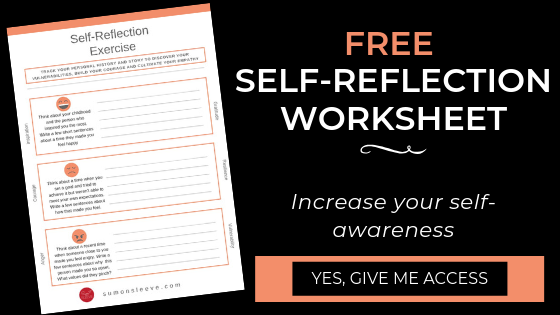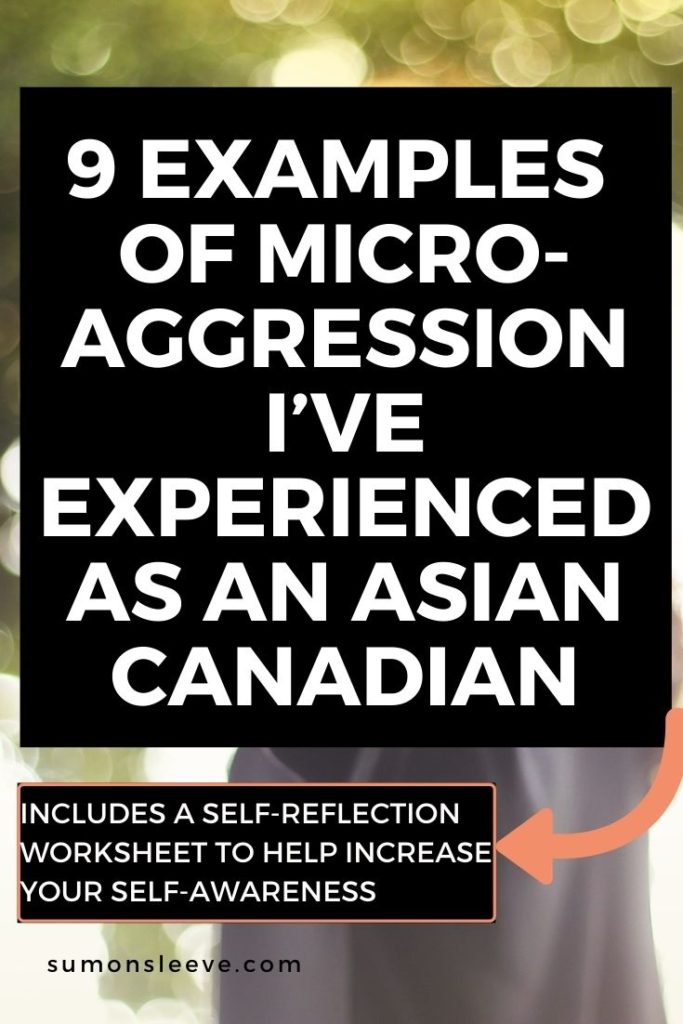Microaggression is subtle. It's hard to tell as the person doing the discriminating or the person being discriminated against. Here are 9 examples of microaggression that I've experienced as an Asian Canadian.

Microaggressions are subtle
I have to admit that as an educated, Canadian-born, Millennial woman, I didn’t know what microaggressions were until I had to look it up for an interview I did with Fairchild TV about the current racism that is going on in my country.
It was late at night; I Googled the word and I started reading. The more I read, the more my eyes opened, revealing a truth about my life. It was as though all the times I had ever felt confusingly uncomfortable about what someone said and/or did came together, spelling the word “microaggression”. I knew I had experienced racism, from being made fun of how I look and what I ate to having someone shout ‘ching chong’ at me while they drove by. Those acts were blatant and obvious.
However, microaggressions are, to say the least, micro. They happen so subtly that after each incident, I would feel confused, unable to pinpoint what I had experienced and what I felt about it.
I didn’t know I was being discriminated against for being Asian because it was unintentional and/or indirect. In addition, the person discriminating against me didn’t know that’s what they were doing.
We don’t know what we don’t know.
That is until now. So here are 9 examples of microaggression I’ve experienced as an Asian.
1. “Where are you from?”
I have been asked this question way too many times to count and my Asian friends all roll their eyes when they hear this. It implies I’m not from here, that I don’t belong, assuming I’m a foreigner. When I was younger, I would get annoyed and say,
“I’m from earth.”
But then they would keep asking,
“No, like where are you really from?”
And I would say,
“Canada.”
And then they would keep pestering,
“No, like where is your family from?”
Then it would go on and on until they find out I’m Chinese. Now, I just cut to the chase and respond,
“I’m born and raised in Canada but my parents are from Hong Kong. Next time, please ask me what culture I identify with instead.”
2. “You’re pretty fluent in English.”
I think, write, dream and converse in English so why wouldn’t I speak it well?
The message that comes across when someone makes a comment about my English speaking skills is that I’m not Canadian; it alienates me due to the colour of my skin, assuming English is my second language.
3. “Say something in Chinese.”
Unless you’re someone who actually knows I also speak Cantonese, it’s discriminatory to ask me to teach you words in my native language. Again, it assumes I am a foreigner and English isn’t my first language.
4. “Ni hao ma?”
This always weirded me out when someone said this. It often came from men who thought they were being clever or that it would somehow impress me. I’d give a weak smile and walk off.
However, it’s discriminatory to assume or mistakenly identify someone from a different Asian ethnicity. Not all Asians are Chinese nor do they all speak Mandarin. Even if they do, it doesn’t mean they want that assumption made about them.
Never assume. Ask.
5. “Can you help me with math?”
In school, it was math and at work, it was an Excel spreadsheet or something that required numbers. Right…because all yellow-skinned folks have the natural ability to crunch numbers and an affinity for data.
This one often confused me because I’m actually good with numbers so I just assumed people were asking me for help because I was indeed good at math.
However, there was a time when I bumped into an old student of mine, a white female whom I tutored French. After we say hi, she introduced me to her friend as her old math tutor. I never tutored her in math. It was an honest mistake but it made me think.
It’s discriminatory to assign a certain level of intelligence to a person based on their race.
6. “Speak up more. Why are you so quiet? We want to hear what you think. Don’t be shy.”
As an introvert, I am not shy but I am quiet. I don’t have issues speaking in front of a crowd, asking someone out, approaching a stranger for help etc. However, every time someone makes a comment about how little I was talking or tells me to be more verbal, I’d get seriously annoyed.
For a long time, I hated that part of myself and thought it was a weakness. However, over the years, I’ve realized that there is nothing wrong with being quiet. What is wrong is when someone believes that only one type of communication style is best, the one that is prevalent in the dominant culture, in this case, white culture.
7. “I don’t see colour. Everyone is the same. We’re all one human race.”
I remember chatting about how much Vancouver has changed with a colleague, an older white male about to retire. He started talking about how he’s seen more and more immigrants come to the city, that it’s great how multicultural it’s gotten and how much he loves Chinese food. He shares how he doesn’t understand why some of his peers complain about the change in demographics. But then he says the whole “colour blind” thing.
It started off as such a nice conversation but then I got uncomfortable. I didn’t know what to say because it seemed like it was an acceptable statement; however, when someone says they don’t see colour, it means they’re denying a person’s racial, cultural and/or ethnic experiences.
8. “I have a weird last name that no one can pronounce so I know what you go through as an Asian.”
This came from a white male with whom I was sharing my struggles of being an Asian in the workplace. When he said this, he went on and on about how he’d get stopped at borders because he had a weird last name. He wanted to relate to my struggles but really, it highlighted his ignorance and unintentionally made things worse.
The racial oppression that a person of colour experiences is not the same as other types of oppression such as gender, sexual orientation, socioeconomic status, or in this case, having an odd last name. When someone clumps those experiences together, it means they are denying their racial biases.
9. “Here you go!” (as she hands me her tray)
I was standing in the food court near the garbage looking for a place to sit when a white woman holding a tray of her trash hands it to me. I was shocked and confused but I took her tray and emptied it for her. At first, I thought I was doing a polite thing since I was beside the trash bins. You know, like holding the door for someone.
But then I realized she thought I was one of the service workers who help clear the tables. I looked around and coincidently, they were all Asian females. However, I wasn’t wearing a uniform nor did I have gloves or a mask on. The woman just assumed I was there to dump her trash. It made me feel like a second-class citizen.
And I don’t want my children to feel this way. Although these experiences shaped who I am and reflect the current social landscape of my generation, it doesn’t mean things can’t change. Because microaggression is subtle, it’s hard to tell it’s happening for the person doing the discrimination or the person being discriminated against. However, a little bit of awareness goes a long way and starting (and continuing) a conversation about it gets us in the right direction.





